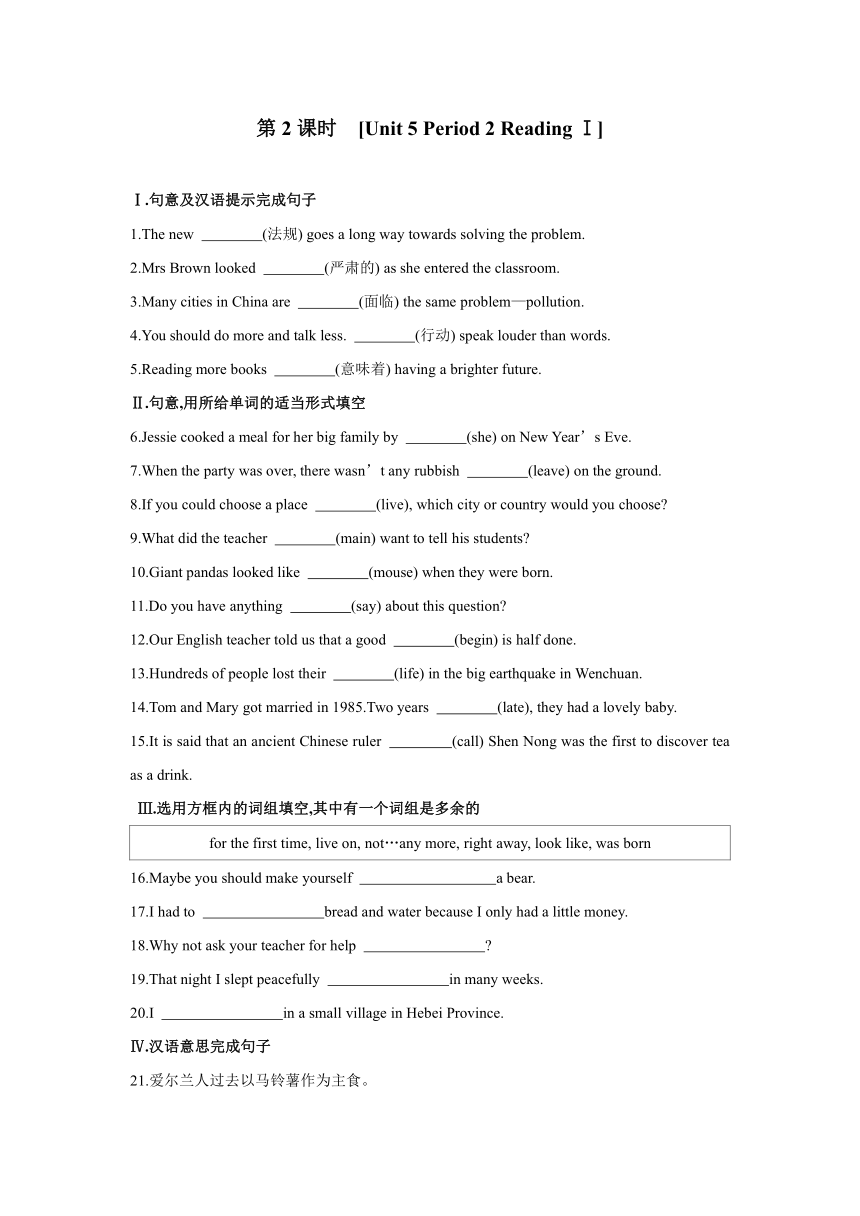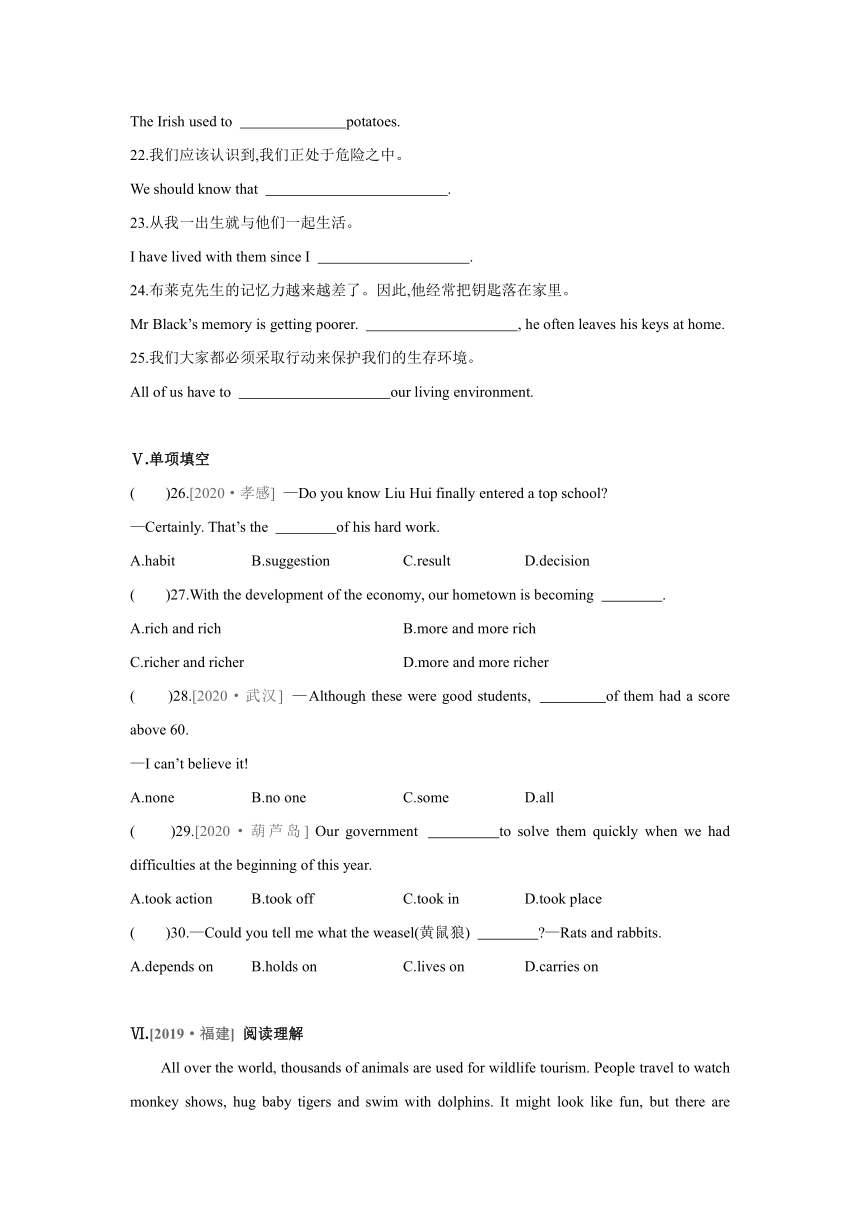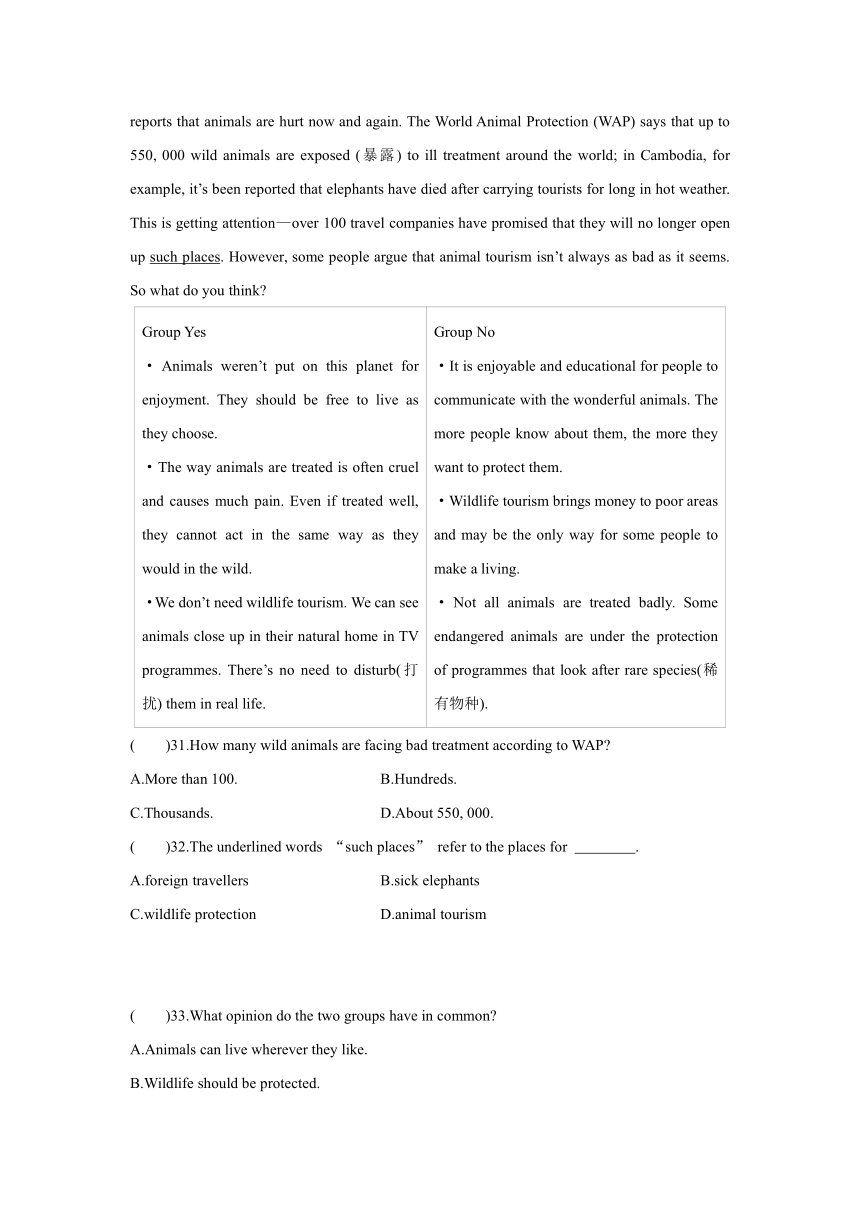牛津译林版英语八年级上册 Unit 5 Wild animals. Period 2 Reading I. 同步课时练习(含答案解析)
文档属性
| 名称 | 牛津译林版英语八年级上册 Unit 5 Wild animals. Period 2 Reading I. 同步课时练习(含答案解析) |  | |
| 格式 | docx | ||
| 文件大小 | 48.7KB | ||
| 资源类型 | 教案 | ||
| 版本资源 | 牛津译林版 | ||
| 科目 | 英语 | ||
| 更新时间 | 2022-06-21 11:54:06 | ||
图片预览



文档简介
第2课时 [Unit 5 Period 2 Reading Ⅰ]
Ⅰ.句意及汉语提示完成句子
1.The new (法规) goes a long way towards solving the problem.
2.Mrs Brown looked (严肃的) as she entered the classroom.
3.Many cities in China are (面临) the same problem—pollution.
4.You should do more and talk less. (行动) speak louder than words.
5.Reading more books (意味着) having a brighter future.
Ⅱ.句意,用所给单词的适当形式填空
6.Jessie cooked a meal for her big family by (she) on New Year’s Eve.
7.When the party was over, there wasn’t any rubbish (leave) on the ground.
8.If you could choose a place (live), which city or country would you choose
9.What did the teacher (main) want to tell his students
10.Giant pandas looked like (mouse) when they were born.
11.Do you have anything (say) about this question
12.Our English teacher told us that a good (begin) is half done.
13.Hundreds of people lost their (life) in the big earthquake in Wenchuan.
14.Tom and Mary got married in 1985.Two years (late), they had a lovely baby.
15.It is said that an ancient Chinese ruler (call) Shen Nong was the first to discover tea as a drink.
Ⅲ.选用方框内的词组填空,其中有一个词组是多余的
for the first time, live on, not…any more, right away, look like, was born
16.Maybe you should make yourself a bear.
17.I had to bread and water because I only had a little money.
18.Why not ask your teacher for help
19.That night I slept peacefully in many weeks.
20.I in a small village in Hebei Province.
Ⅳ.汉语意思完成句子
21.爱尔兰人过去以马铃薯作为主食。
The Irish used to potatoes.
22.我们应该认识到,我们正处于危险之中。
We should know that .
23.从我一出生就与他们一起生活。
I have lived with them since I .
24.布莱克先生的记忆力越来越差了。因此,他经常把钥匙落在家里。
Mr Black’s memory is getting poorer. , he often leaves his keys at home.
25.我们大家都必须采取行动来保护我们的生存环境。
All of us have to our living environment.
Ⅴ.单项填空
( )26.[2020·孝感] —Do you know Liu Hui finally entered a top school
—Certainly. That’s the of his hard work.
A.habit B.suggestion C.result D.decision
( )27.With the development of the economy, our hometown is becoming .
A.rich and rich B.more and more rich
C.richer and richer D.more and more richer
( )28.[2020·武汉] —Although these were good students, of them had a score above 60.
—I can’t believe it!
A.none B.no one C.some D.all
( )29.[2020·葫芦岛] Our government to solve them quickly when we had difficulties at the beginning of this year.
A.took action B.took off C.took in D.took place
( )30.—Could you tell me what the weasel(黄鼠狼) —Rats and rabbits.
A.depends on B.holds on C.lives on D.carries on
Ⅵ.[2019·福建] 阅读理解
All over the world, thousands of animals are used for wildlife tourism. People travel to watch monkey shows, hug baby tigers and swim with dolphins. It might look like fun, but there are reports that animals are hurt now and again. The World Animal Protection (WAP) says that up to 550, 000 wild animals are exposed (暴露) to ill treatment around the world; in Cambodia, for example, it’s been reported that elephants have died after carrying tourists for long in hot weather. This is getting attention—over 100 travel companies have promised that they will no longer open up such places. However, some people argue that animal tourism isn’t always as bad as it seems. So what do you think
Group Yes ·Animals weren’t put on this planet for enjoyment. They should be free to live as they choose. ·The way animals are treated is often cruel and causes much pain. Even if treated well, they cannot act in the same way as they would in the wild. ·We don’t need wildlife tourism. We can see animals close up in their natural home in TV programmes. There’s no need to disturb(打扰) them in real life. Group No ·It is enjoyable and educational for people to communicate with the wonderful animals. The more people know about them, the more they want to protect them. ·Wildlife tourism brings money to poor areas and may be the only way for some people to make a living. ·Not all animals are treated badly. Some endangered animals are under the protection of programmes that look after rare species(稀有物种).
( )31.How many wild animals are facing bad treatment according to WAP
A.More than 100. B.Hundreds.
C.Thousands. D.About 550, 000.
( )32.The underlined words “such places” refer to the places for .
A.foreign travellers B.sick elephants
C.wildlife protection D.animal tourism
( )33.What opinion do the two groups have in common
A.Animals can live wherever they like.
B.Wildlife should be protected.
C.Animal tourism supports poor people.
D.Wildlife is well looked after.
( )34.“Group Yes” suggests that people should not disturb animals .
A.in Cambodia B.in travel companies
C.in real life D.in poor areas
( )35.What is the text mainly about
A.Ways of protecting rare species.
B.Different opinions on wildlife tourism.
C.How to bring tourists enjoyment.
D.Whether to collect information on wildlife.
Ⅶ.短文内容及首字母提示,写出所缺单词,使短文完整、通顺
While Tom and Mary were on holiday at the seaside(海边), they enjoyed 36.w the seagulls(海鸥).They learned a 37.l about these lovely birds. The seagulls often come 38.c to you when you are eating something. If you throw pieces of bread to them, they at once catch them.
Seagulls swim very 39.w , but they don’t often dive for fish. They are good at
f with their wings. When a seagull is in the 41.s , he puts his legs under his body. Tom often watched them come to the ground. The seagulls beat the air 42.w their wings and put down their feet before they touched the ground. Mary liked to 43.s them gliding(滑翔) over the water as they often do, without 44.m their wings, 45.b
she said she didn’t like the noise they made.
答案
第2课时 [Unit 5 Period 2 Reading Ⅰ]
Ⅰ.1.law 2.serious 3.facing
4.Actions 5.means
Ⅱ.6.herself 7.left 8.to live 9.mainly
10.mice 11.to say 12.beginning
13.lives 14.later 15.called
Ⅲ.16.look like 17. live on 18. right away
19. for the first time 20. was born
Ⅳ.21.live on 22. we are in danger
23. was born 24. As a result
25. take action to protect
Ⅴ.26.C 考查名词辨析。句意:“你知道刘辉最后考上了一所顶尖学校吗?”“当然。那是他努力学习的结果。”habit意为“习惯”;suggestion意为“建议”;result意为“结果”;decision意为“决定”。由句意可知选C。
27.C 考查形容词的比较级。句意:随着经济的发展,我们的家乡正变得越来越富裕。“比较级+and+比较级”,意为“越来越……”。rich为单音节形容词,其比较级为richer。
28.A 考查不定代词的用法。句意:“虽然这些都是好学生,但他们的分数都没有超过60分。”“我简直不敢相信!”none意为“没有一个;毫无”,可与of连用;no one意为“没有人”,后面不能跟of短语;some意为“一些”;all意为“所有的,全部的”。结合句意可知,没有人超过60分,none符合语境。
29.A 考查动词短语辨析。句意:在今年的年初,当我们遇到困难的时候,我们政府采取行动,快速地解决了它们。take action意为“采取行动”;take off意为“脱掉;起飞”;take in意为“接受”;take place意为“发生”。
30.C 考查动词短语辨析。depend on意为“取决于,依靠”;hold on意为“不挂断电话,等一下”;live on意为“以……为生,以……为食”;carry on意为“继续”。句意:“你能告诉我黄鼠狼以什么为食吗?”“老鼠和兔子。”故选C。
Ⅵ.31.D 细节理解题。第一段第四句“…up to 550,000 wild animals are exposed to ill treatment around the world”可知,全世界有多达55万只野生动物受到虐待。
32.D 词义猜测题。前文介绍了因游客参观而使动物受到伤害的事,因此旅游公司不开放的地方应该为观赏动物的地方。
33.B 细节理解题。Group Yes的观点认为“不要打扰野生动物”,Group No的观点是“为了更好地了解野生动物”,两种观点都为了更好地保护野生动物。
34.C 细节理解题。由Group Yes中的最后一句“There's no need to disturb them in real life.”可知,人们不应该在野生动物的真实生活中打扰它们。
35.B 主旨大意题。本文主要描述了人们对保护野生动物的两种不同的观点。
Ⅶ.36.watching 37.lot 38.close
39.well 40.flying 41.sky
42.with 43.see 44.moving 45.but
Ⅰ.句意及汉语提示完成句子
1.The new (法规) goes a long way towards solving the problem.
2.Mrs Brown looked (严肃的) as she entered the classroom.
3.Many cities in China are (面临) the same problem—pollution.
4.You should do more and talk less. (行动) speak louder than words.
5.Reading more books (意味着) having a brighter future.
Ⅱ.句意,用所给单词的适当形式填空
6.Jessie cooked a meal for her big family by (she) on New Year’s Eve.
7.When the party was over, there wasn’t any rubbish (leave) on the ground.
8.If you could choose a place (live), which city or country would you choose
9.What did the teacher (main) want to tell his students
10.Giant pandas looked like (mouse) when they were born.
11.Do you have anything (say) about this question
12.Our English teacher told us that a good (begin) is half done.
13.Hundreds of people lost their (life) in the big earthquake in Wenchuan.
14.Tom and Mary got married in 1985.Two years (late), they had a lovely baby.
15.It is said that an ancient Chinese ruler (call) Shen Nong was the first to discover tea as a drink.
Ⅲ.选用方框内的词组填空,其中有一个词组是多余的
for the first time, live on, not…any more, right away, look like, was born
16.Maybe you should make yourself a bear.
17.I had to bread and water because I only had a little money.
18.Why not ask your teacher for help
19.That night I slept peacefully in many weeks.
20.I in a small village in Hebei Province.
Ⅳ.汉语意思完成句子
21.爱尔兰人过去以马铃薯作为主食。
The Irish used to potatoes.
22.我们应该认识到,我们正处于危险之中。
We should know that .
23.从我一出生就与他们一起生活。
I have lived with them since I .
24.布莱克先生的记忆力越来越差了。因此,他经常把钥匙落在家里。
Mr Black’s memory is getting poorer. , he often leaves his keys at home.
25.我们大家都必须采取行动来保护我们的生存环境。
All of us have to our living environment.
Ⅴ.单项填空
( )26.[2020·孝感] —Do you know Liu Hui finally entered a top school
—Certainly. That’s the of his hard work.
A.habit B.suggestion C.result D.decision
( )27.With the development of the economy, our hometown is becoming .
A.rich and rich B.more and more rich
C.richer and richer D.more and more richer
( )28.[2020·武汉] —Although these were good students, of them had a score above 60.
—I can’t believe it!
A.none B.no one C.some D.all
( )29.[2020·葫芦岛] Our government to solve them quickly when we had difficulties at the beginning of this year.
A.took action B.took off C.took in D.took place
( )30.—Could you tell me what the weasel(黄鼠狼) —Rats and rabbits.
A.depends on B.holds on C.lives on D.carries on
Ⅵ.[2019·福建] 阅读理解
All over the world, thousands of animals are used for wildlife tourism. People travel to watch monkey shows, hug baby tigers and swim with dolphins. It might look like fun, but there are reports that animals are hurt now and again. The World Animal Protection (WAP) says that up to 550, 000 wild animals are exposed (暴露) to ill treatment around the world; in Cambodia, for example, it’s been reported that elephants have died after carrying tourists for long in hot weather. This is getting attention—over 100 travel companies have promised that they will no longer open up such places. However, some people argue that animal tourism isn’t always as bad as it seems. So what do you think
Group Yes ·Animals weren’t put on this planet for enjoyment. They should be free to live as they choose. ·The way animals are treated is often cruel and causes much pain. Even if treated well, they cannot act in the same way as they would in the wild. ·We don’t need wildlife tourism. We can see animals close up in their natural home in TV programmes. There’s no need to disturb(打扰) them in real life. Group No ·It is enjoyable and educational for people to communicate with the wonderful animals. The more people know about them, the more they want to protect them. ·Wildlife tourism brings money to poor areas and may be the only way for some people to make a living. ·Not all animals are treated badly. Some endangered animals are under the protection of programmes that look after rare species(稀有物种).
( )31.How many wild animals are facing bad treatment according to WAP
A.More than 100. B.Hundreds.
C.Thousands. D.About 550, 000.
( )32.The underlined words “such places” refer to the places for .
A.foreign travellers B.sick elephants
C.wildlife protection D.animal tourism
( )33.What opinion do the two groups have in common
A.Animals can live wherever they like.
B.Wildlife should be protected.
C.Animal tourism supports poor people.
D.Wildlife is well looked after.
( )34.“Group Yes” suggests that people should not disturb animals .
A.in Cambodia B.in travel companies
C.in real life D.in poor areas
( )35.What is the text mainly about
A.Ways of protecting rare species.
B.Different opinions on wildlife tourism.
C.How to bring tourists enjoyment.
D.Whether to collect information on wildlife.
Ⅶ.短文内容及首字母提示,写出所缺单词,使短文完整、通顺
While Tom and Mary were on holiday at the seaside(海边), they enjoyed 36.w the seagulls(海鸥).They learned a 37.l about these lovely birds. The seagulls often come 38.c to you when you are eating something. If you throw pieces of bread to them, they at once catch them.
Seagulls swim very 39.w , but they don’t often dive for fish. They are good at
f with their wings. When a seagull is in the 41.s , he puts his legs under his body. Tom often watched them come to the ground. The seagulls beat the air 42.w their wings and put down their feet before they touched the ground. Mary liked to 43.s them gliding(滑翔) over the water as they often do, without 44.m their wings, 45.b
she said she didn’t like the noise they made.
答案
第2课时 [Unit 5 Period 2 Reading Ⅰ]
Ⅰ.1.law 2.serious 3.facing
4.Actions 5.means
Ⅱ.6.herself 7.left 8.to live 9.mainly
10.mice 11.to say 12.beginning
13.lives 14.later 15.called
Ⅲ.16.look like 17. live on 18. right away
19. for the first time 20. was born
Ⅳ.21.live on 22. we are in danger
23. was born 24. As a result
25. take action to protect
Ⅴ.26.C 考查名词辨析。句意:“你知道刘辉最后考上了一所顶尖学校吗?”“当然。那是他努力学习的结果。”habit意为“习惯”;suggestion意为“建议”;result意为“结果”;decision意为“决定”。由句意可知选C。
27.C 考查形容词的比较级。句意:随着经济的发展,我们的家乡正变得越来越富裕。“比较级+and+比较级”,意为“越来越……”。rich为单音节形容词,其比较级为richer。
28.A 考查不定代词的用法。句意:“虽然这些都是好学生,但他们的分数都没有超过60分。”“我简直不敢相信!”none意为“没有一个;毫无”,可与of连用;no one意为“没有人”,后面不能跟of短语;some意为“一些”;all意为“所有的,全部的”。结合句意可知,没有人超过60分,none符合语境。
29.A 考查动词短语辨析。句意:在今年的年初,当我们遇到困难的时候,我们政府采取行动,快速地解决了它们。take action意为“采取行动”;take off意为“脱掉;起飞”;take in意为“接受”;take place意为“发生”。
30.C 考查动词短语辨析。depend on意为“取决于,依靠”;hold on意为“不挂断电话,等一下”;live on意为“以……为生,以……为食”;carry on意为“继续”。句意:“你能告诉我黄鼠狼以什么为食吗?”“老鼠和兔子。”故选C。
Ⅵ.31.D 细节理解题。第一段第四句“…up to 550,000 wild animals are exposed to ill treatment around the world”可知,全世界有多达55万只野生动物受到虐待。
32.D 词义猜测题。前文介绍了因游客参观而使动物受到伤害的事,因此旅游公司不开放的地方应该为观赏动物的地方。
33.B 细节理解题。Group Yes的观点认为“不要打扰野生动物”,Group No的观点是“为了更好地了解野生动物”,两种观点都为了更好地保护野生动物。
34.C 细节理解题。由Group Yes中的最后一句“There's no need to disturb them in real life.”可知,人们不应该在野生动物的真实生活中打扰它们。
35.B 主旨大意题。本文主要描述了人们对保护野生动物的两种不同的观点。
Ⅶ.36.watching 37.lot 38.close
39.well 40.flying 41.sky
42.with 43.see 44.moving 45.but
